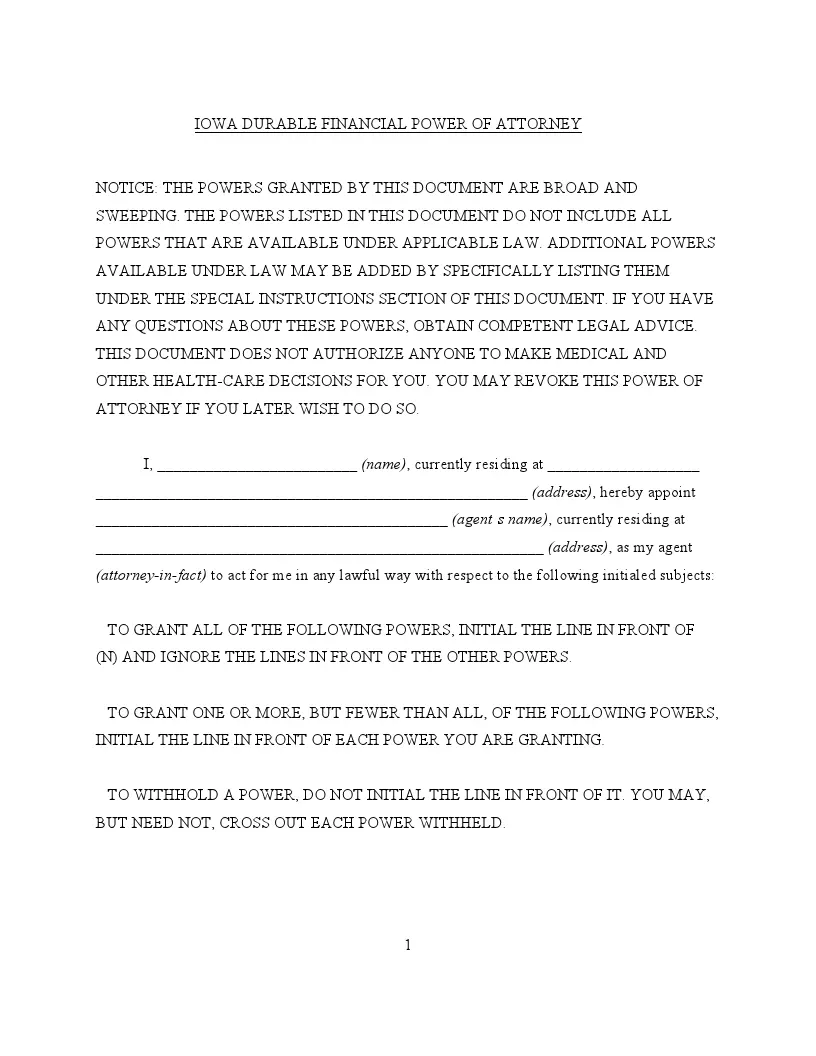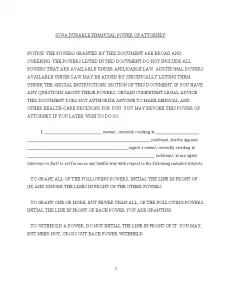Free Iowa Durable Power of Attorney Form
The Iowa durable power of attorney is a legal document that allows an individual (known as the “principal”) to appoint another person (known as the “agent” or “attorney-in-fact”) to manage their financial affairs and make decisions on their behalf. This form is called “durable” because it remains effective even if the principal becomes incapacitated or unable to make decisions themselves.
In Iowa, as in many states, this document is commonly used to plan for future scenarios where an individual might be unable to manage their financial matters due to illness, disability, or absence. The agent can be given a wide range of powers, such as handling banking transactions, managing real estate, making investment decisions, and dealing with tax matters.
A durable POA form is an important tool for estate planning. It ensures that the principal’s financial matters are handled according to their wishes, even when they cannot personally oversee them. By the way, a durable power of attorney doesn’t affect health care issues; it just designates someone to handle your money and property if you can’t. For end-of-life treatment decisions, consider other Iowa POA forms.

Build Your Document
Answer a few simple questions to make your document in minutes
Save and Print
Save progress and finish on any device, download and print anytime
Sign and Use
Your valid, lawyer-approved document is ready
Iowa Signing Requirements and Laws
In Iowa, the execution of a durable power of attorney must adhere to specific legal requirements to ensure its validity. These requirements protect the principal’s interests and ensure the document reflects their genuine intentions.
First and foremost, the principal must be an adult of sound mind when signing the POA. This means they must fully understand the nature of the document and the extent of the powers they are granting to another person. The POA must be in writing, identify the principal and the agent, and delineate the powers granted to the agent. Iowa law requires that the document be signed by the principal and acknowledged before a notary public (Iowa Code, § 633B.105).
Additionally, while not a legal requirement, it is advisable for the signing to be witnessed by at least one or more adults who are not named as agents in the document. These witnesses can provide further evidence that the principal was of sound mind and acted without coercion.
Once signed and notarized, the durable power of attorney is effective immediately unless the document specifies a different effective date or conditions under which it becomes effective. It remains in effect until the principal’s death unless it is revoked. The principal can revoke the POA at any time as long as they are competent.
Iowa Durable Power of Attorney Form Details
| Document Name | Iowa Durable Power of Attorney Form |
| Other Names | Iowa Financial Durable Power of Attorney, IA DPOA |
| Relevant Laws | Iowa Code, Section 633B.105 |
| Signing Requirements | Notary Public |
| Avg. Time to Fill Out | 10 minutes |
| # of Fillable Fields | 37 |
| Available Formats | Adobe PDF |
Popular Local Durable POA Forms
Durable POA documents are used in each and every state. Take a look at other popular DPOA forms frequently filled out by Americans.
Steps to Complete the Form
When filling out the Iowa statutory durable power of attorney, you must follow each step carefully to ensure the document is legally valid and accurately reflects your intentions.
1. Designation of Agent
Start by entering your full name to affirm your identity as the principal. Continue by entering the name, address, and phone number of the person you designate as your agent. This person will be able to handle your financial affairs on your behalf.
2. Designation of Successor Agent(s)
If you wish to appoint a successor agent who will take over if your primary agent cannot serve, provide their details here. This section is optional, but it’s advisable to have a backup. Fill in your successor agent’s name, address, and telephone number. You can also appoint a second successor agent using the same process.
3. Grant of General Authority
In this section, you will specify the powers you grant your agent by initialing next to the applicable powers. These include managing real property, handling financial accounts, and dealing with insurance. If you prefer to grant all listed powers, you may initial “All Preceding Subjects.”
4. Grant of Specific Authority (Optional)
Here, you can grant your agent additional powers that may have significant implications for your property and estate. This section requires careful consideration, and you should initial only next to the specific authorities you want to grant.
5. Special Instructions (Optional)
You may use this space to provide specific instructions not covered elsewhere in the form. It could include limitations on the agent’s powers, conditions of their authority, or any other special directives you deem necessary.
6. Effective Date
Indicate when the power of attorney will become effective. By default, it becomes effective immediately upon signing unless specified otherwise in the special instructions.
7. Nomination of Conservator and Guardian (Optional)
If you believe it might become necessary for a court to appoint a conservator or guardian for you, you can nominate your preferred candidates here. Provide their names, addresses, and telephone numbers.
8. Signature and Acknowledgment
To finalize the form, sign and date it in the presence of a notary. The notary will then fill in the state and county, acknowledge the date, and verify your identity before signing and sealing the document. This step is critical as it validates the entire form.

Listed here are various other Iowa documents filled out by our users. Try our step-by-step builder to customize these forms to your needs.
Download a Free Iowa Durable Power of Attorney Form
